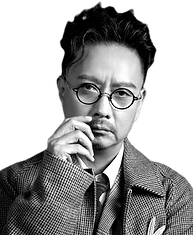We need your contribution of idea!
If you are Choi Hung Estate resident or you are keen on providing insight, just contact us by email or Instagram DM now!
We do not have a definitive solution for the preservation of Choi Hung Estate, as it requires further discussion among all stakeholders involved. Therefore, we need inspiration to better understand the challenges and opportunities from various perspectives. While reusing public housing heritage may be a relatively new concept in Hong Kong, it has been successfully implemented and within a mature heritage protection framework in the UK and other regions. What can we learn from that?
The ideas pool invites both international and local heritage, architectural experts to share their insights on the topic, and we also include residents of Choi Hung Estate to gain their unique perspective on the estate's value.

‘’ What’s truly worth keeping is the people-oriented spirit that made everyday life so convenient. ‘’
Former Choi Hung Estate's resident; Actor
Tse Kwan Ho
How long have you lived in Choi Hung Estate? What changes or constants have you observed over the years?
Do you have any memorable anecdotes to share?
If you could preserve part of Choi Hung Estate, what would you want to keep?
it is a translated version and that for precise wording, please refer to the Chinese text.
I’ve lived in Choi Hung Estate for over 20 years—basically ever since it was built. I went to kindergarten at Taoist Association Yuen Yuen kindergarten, just beneath Chi Mei House. For primary school, I attended S.K.H. Ching Shan Primary School. So, before secondary school, all my daily activities happened within the estate. In the very beginning, there was no photo spot like the basketball court that exists now. That area used to be a rough playing field with uneven ground—you were guaranteed to scrape your knees if you fell. Later on, as many families’ children started working and earning a living, households gradually accumulated some savings. Private cars became more common, and parking spaces became insufficient, which eventually led to the construction of the current car park.
The current photo spot is the basketball court. Back then, there was a running track encircling it, probably designed for residents to jog. One day, someone started roller-skating there, and it kicked off a roller-skating craze. During that time, every kid was out there skating. The sound of those roller skates—so loud and chaotic—is something I’ll never forget.
Honestly, the overall design of Choi Hung Estate is excellent—very people-oriented. Each unit has a kitchen and bathroom, and there’s a veranda, which I think was intended to give residents the feel of a semi-outdoor balcony. The internal streets are neat and organised—you feel very comfortable walking through them. The estate has both low-rise and high-rise blocks, with the tallest being 20 storeys. Inside, there are shops, a market, children’s playgrounds, a youth centre, a secondary school, a primary school, a clinic, and a pharmacy. There were also street vendors and cooked food stalls selling things like cart noodles—basically, everything you could need. So I think, apart from preserving such a well-thought-out design, what’s truly worth keeping is the people-oriented spirit that made everyday life so convenient.

‘’ My home is not just the my flat I’m living in Choi Hung Estate; the entire Choi Hung Estate is my home. ‘’
Choi Hung Estate's resident
Carlos Lin
How long have you lived in Choi Hung Estate? What changes or constants have you observed over the years?
Do you have any memorable anecdotes to share?
If you could preserve part of Choi Hung Estate, what would you want to keep?
it is a translated version and that for precise wording, please refer to the Chinese text.
I have lived in Choi Hung Estate for nearly 30 years, and over the years, the changes have not been significant. The small shops, bakeries, snack shops, fast food restaurants, hair salons (even though I’ve never had a haircut there), and stationery stores that were here when I was young are still around. Over time, more chain stores have joined, such as 7-Eleven (which used to be just OK), 759 Store, and Japan Home Centre. Additionally, facilities like the low-rise buildings and the connection to the MTR have added elevators. These changes have not affected the overall feeling of Choi Hung Estate and have made life more convenient for residents. The biggest change for me was the park downstairs, where two nearly ten-story tall trees were uprooted by Typhoon Mangkhut, resulting in the loss of the shade and the sounds of birds.
I'm not sure if this counts as a funny story, but when I was in elementary school, a classmate invited me to their home to play, and I mistakenly went to the same unit in another building. I later realised that several low-rise buildings were connected. I also have some childhood memories; perhaps because of the long, straight corridor design, it was easier to interact with neighbors. When I was young, I often greeted them, and the neighbor would offer me candy or red envelopes. Since my home was close to the entrance, I would make new friends through the gate. Living on a lower floor, there was a park downstairs, and my mom would call out from the window for me to come home while I was playing!
The high-rise buildings in Choi Hung Estate surround the low-rise buildings and small shops, forming a small community. Any major changes would affect the unique feeling of Choi Hung Estate. If something must be preserved, I think it should be the exterior wall of Choi Hung, a small yet distinctive part that holds symbolic significance.

‘’ Choi Hung Estate has accompanied me and my family as we grew up, filled with family memories; it is my most cherished and beloved place in Hong Kong‘’
Former Choi Hung Estate's resident
Ar Tung
How long have you lived in Choi Hung Estate? What changes or constants have you observed over the years?
Do you have any memorable anecdotes to share?
If you could preserve part of Choi Hung Estate, what would you want to keep?
When I was young, my parents had to work and didn't have time to care for me, so I was looked after by my grandparents who lived in Choi Hung Estate. I lived there for six years until I moved away to start elementary school, but I would return at least once a week to have dinner with my grandparents. During holidays, the whole family would definitely come back to celebrate at Choi Hung. Now, my grandfather has passed away, and only my grandmother and a helper live in the unit. Over the years, I feel that Choi Hung has not changed much; most of the shops are still there, and familiar neighbors remain. The only change might be that the basketball court has more people now, as my grandparents’ unit overlooks it. Since Choi Hung has become a popular photo spot, I often see people of different nationalities taking pictures at the basketball court. Additionally, when I was young, many vendors used to set up stalls outside the tunnel near Choi Hung Station, selling various toys and goods. My grandfather often bought me toys there, but now there are hardly any vendors left. There was also a pork shop that was familiar with my grandmother, which often gave her extra pork, but I don’t know when it closed down.
My aunt told me that they moved to Choi Hung about sixty years ago, just when my father was born, so my grandmother often says my father is lucky to have had public housing from birth. My aunt said this place accompanied them as they grew up; when my father attended Choi Hung Catholic School, my aunt would accompany him back to school, and the tree at the school gate was just a small tree back then, which has now grown into a tall banyan tree over ten meters high. I loved living in Choi Hung when I was young. My grandfather would pick me up from school every day and take me to play in the playground, while my grandmother gently taught me how to write and would put me to sleep. This helped me build a close relationship with them. When my parents would come to take me back to their home on weekends, I was very reluctant. Around the age of four, there was a time when my dad drove over to pick me up, and I cried, saying I didn't want to leave my grandmother. My dad, helpless, picked me up and put me in the car, but while waiting at a traffic light, I opened the car door and ran back to my grandmother, scaring my dad half to death. Additionally, our family often celebrated festivals at Choi Hung. During the Mid-Autumn Festival, my grandfather would buy musical lanterns for me and my cousins to play with, while my grandmother would make lanterns from pomelo peels. After dinner, the whole family would take lanterns and glow sticks to the basketball court to enjoy the moon and play. The basketball court would be lively during the Mid-Autumn Festival, with many children playing while adults chatted over mooncakes and fruits, creating fond memories. My grandparents had a great relationship with the neighbors. About ten years ago, a single lady moved into the opposite building, and knowing she lived alone, my grandmother would often give her soup and invite her to eat with us. The lady would also gift us clothing samples from her work and invite us over to play. Last year, my grandmother celebrated her ninety-fifth birthday, and the lady participated, making it feel like family.
I hope to preserve the entire Choi Hung Estate. To me, Choi Hung is a whole; the people, facilities, and shops within it all contribute to what I know. As far as I know, Choi Hung is facing demolition and reconstruction, with the first phase of residents moving to Mei Tung Estate, and the second and third phases relocating to newly built buildings. This means that the community networks established by the first phase of residents will be disrupted, requiring them to adapt to a new community. Other residents will also need to move from their original homes to new units, and it is uncertain what will happen to the shops in Choi Hung. My grandmother has lived in her unit for about sixty years, which has accompanied my father, my aunt, and me as we grew up, filled with many precious memories. We still return to celebrate festivals and enjoy visiting my grandmother. Even after my marriage, I returned to the basketball court to take wedding photos. It’s hard to imagine what will happen if this place disappears or changes completely. My grandfather left us over ten years ago, and after the reconstruction, I don’t know if my grandmother will still be there. If Choi Hung changes, how will I be able to find the memories I've cherished all these years? From my understanding of reconstruction in Hong Kong, it often involves tearing everything down to build new communities, without considering the architectural value of the original place, the relationships among people, and collective memories. In Japan, Singapore, and many European countries, many buildings can be preserved for hundreds of years. If preservation is desired, it is certainly possible; restoration and maintenance are one approach. It just depends on how much the Housing Authority or the government values this place and the collective memories associated with it. For me, this place holds my family's memories. I hope to preserve the entire Choi Hung Estate and support not relocating or demolishing it.
it is a translated version and that for precise wording, please refer to the Chinese text.
